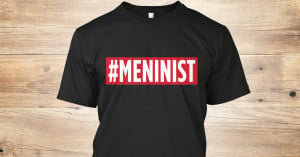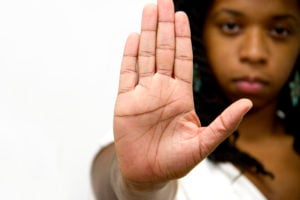Alright, guys. It’s time we had a chat.
There’s a lot of talk out there bemoaning feminism. One common chorus is that the feminist movement requires women to be butch and men to be effeminate.
Many also suggest that feminism attempts to oppress men.
These misrepresentations and misunderstandings have inspired some to “reclaim” the rights of men. Sometimes calling themselves meninists, these men’s rights advocates situate themselves as a counterpoint to the so-called dangers of feminism.
Indeed, many meninists claim that they are the true champions of gender equality.
Before continuing, though, let me share a little about myself: I’m a heterosexual, White male. I’ve been happily married for over three years now. My wife and I have an equitable relationship; I’m not “whipped,” “broken,” or “kept.” And neither is she.
I live in New York City, but I haven’t always. In fact, I spent most of my life in a small-ish, predominantly White, middle class town in the Midwest that tends to vote red.
I’m also a feminist.
Now, I get it.
Sometimes it feels like there’s “reverse sexism” out there. And men do struggle. But before rejecting feminism and turning towards meninism, let’s try to better understand what’s going on.
There are two sides to the men’s rights movement. On one side, some meninists argue that feminism takes away their agency in many arenas. On the other side, men utilize meninism as a vehicle to further oppress women.
Let’s start by exploring the sincere worries of those who express objections to feminism.
Why Do Some Men Feel Oppressed?
In my experience, serious men’s rights advocates typically articulate three different grievances against feminism.
1. Affirmative Action
One common critique argues that affirmative action actually makes it easier for women to get jobs than men.
Echoing critiques against racialized affirmative action, some men claim that unqualified women have gotten jobs simply because they’re women. Then, writing themselves as victims, they suggest that these women “stole” their jobs.
2. Family Court
Some men’s rights advocates perceive divorce proceedings to be unfair and biased towards women.
Pointing to seemingly hefty alimony checks or disproportionate child custody, many claim that men are the targets of a prejudicial court system.
3. Masculinity
Perhaps the most common meninist critique states, “Yesterday’s men are today’s misogynists.” Or, put another way, some men ask, “Why can’t men just be men, and women just be women?”
Many men’s rights advocates claim that feminism requires men to be feminine and women to be masculine. They argue that feminists attempt to prevent them from being “real men.”
Alright, I understand these feelings. I don’t agree with them, but I understand them.
Feminism talks about patriarchy and male privilege. And sometimes it seems that men are blamed for a lot of social problems.
I mean, how can men be privileged if they’re being criticized for so much, right? Men struggle, too. So, aren’t they the true victims?
Male Privilege
No, men are not the true victims.
This is not to say that men have not struggled. Of course we have. But that doesn’t mean that we’re being oppressed.
There is a difference between individual struggles that some men face and the systematic sexism that all women encounter.
And that each of us has confronted individual struggles doesn’t mean that we all haven’t benefited from male privilege.
Let’s take another look at the grievances discussed above.
1. Affirmative Action Is Not a Quota System
Sexism continues in the United States, and that is reflected by women being underrepresented in the workplace.
Women only make up 20% of elected officials and only 5% of CEOs of fortune 500 companies (an historic high!). And women still only make 77 cents for every dollar earned by their male counterparts – and that’s only for white people!
Affirmative action, though, does not give jobs or college admission to undeserving individuals. What it does do, however, is attempt to level the playing field by disrupting some of sexism’s barriers while undermining male privilege’s unearned benefits.
2. We Only Have Ourselves to Blame for Family Court Biases
First of all, the perception that family court is biased towards women is only that – a perception.
In fact, alimony and child support laws are gender neutral.
Only, here’s the thing: For years, many men have argued that women are more naturally nurturing than men. They have suggested that women are more suited for the home, whereas men belong in the workplace.
In many spheres, such thinking has started to alter. Nonetheless, such prejudice leaves a legacy.
Is it surprising that after generations of men confining women to the home and relegating children to their mothers that such social presumptions endure?
Like I said above, women are still underrepresented in most college departments and professions. And when in the workplace, they still earn less than men.
At the same time, women often remain more responsible for childcare.
But that has nothing to do with the courts. Because when fathers ask for custody of their children, they often get it.
So, why don’t more father’s have more custody? And why are they paying more in alimony and child support?
Because many fathers don’t request custody of their children.
Given such systematic differences, is it any wonder that many ex-wives receive alimony and increased child custody?
3. Feminism Isn’t Anti-Masculinity – It’s Anti-Oppression
Contrary to the claims of some men’s rights advocates, feminists do not insist that all men should be feminine or that all women should be masculine.
They do not insist upon particular expressions of gender at all!
That is, feminism rejects the notion that gender should be prescriptive. Women can be feminine or masculine, just like men can be feminine or masculine. Feminism even argues that we rethink what “masculine” and “feminine” even mean in the first place!
So, it’s okay for men to be masculine. But they shouldn’t have to be, just as women shouldn’t have to conform to a single identity to be “true women.”
Moreover, we shouldn’t conflate masculinity with patriarchy. That is, male dominance is not a prerequisite for masculinity.
Masculinity is defined as the qualities traditionally associated with individuals gendered as men. That, in and of itself, though, does not define men as superior.
That’s toxic masculinity.
Toxic masculinity narrowly (and dangerously) defines “real men” as strong, violent, emotionless, sexually aggressive, and “wolf-like.” It suggests that there is only a finite range of social, political, and sexual attitudes that men can hold.
That’s where male dominance comes in.
Yesterday’s men are not today’s misogynists. Yesterday’s misogynists are today’s misogynists.
The bigger question, then, is why do some men feel threatened by changing notions of gender and the empowerment of women? And why do some men – even those who describe themselves as advocates for gender equality – misrepresent and belittle feminism?
No Joking Matter
Look, fellas, I’ve heard the jokes. And I’ve seen the Twitter feed.
The term “meninist” has arisen out of a climate that portrays the feminist movement as extreme, absurd, unnecessary, and – more recently – a punch line.
Some meninists tease that all feminist women are man-haters who burn bras and don’t shave (which is so creative). They also tease that all feminist men are somehow “broken” – either by their feminist girlfriends or by society’s growing “feminist mentality.”
Still others suggest that feminism is merely an expression of those looking for problems that don’t really exist. Following this logic, then, if women can get a movement, so can men!
And I get it. Most of the people who jokingly use #meninist or #LikeABoy, for example, don’t intend to be hurtful.
It’s just a joke, right?
Well, no.
We’ve all heard the adage “There’s an element of truth in every joke.”
Such joking not only reveals what you think about feminism, but it also reproduces the very male-dominant systems of power that make feminism so necessary.
So, I ask: Why is #meninist supposed to be funny?
People find #meninist humorous because it is still socially acceptable to belittle feminism.
And why is it still socially acceptable to belittle feminism? Because despite some men’s claims that sexism is over, it is still socially acceptable to belittle women.
How we treat feminism is a reflection of how we treat women. If we fail to take feminism seriously, we fail to take women seriously. And that has a negative impact in the workplace, at home, on the street – everywhere.
Sexist jokes might seem funny to the men telling them.
But believe me, women who have been raped, or abused, or sex-shamed, or passed over for a promotion (or worried that any number of these things might happen to them on a daily basis) don’t find these jokes funny. And they don’t find feminism funny either.
Clearly these jokes reveal pervading sexism.
After all, if we can’t take a movement meant to empower women seriously, what does that say about our view of women?
But these jokes also reveal that some men feel victimized. They reveal that some men misunderstand both feminism and their own relationship to privilege and oppression.
Feminism for All
I’m just going to put it out there: As a man, I don’t need meninism or the men’s rights movement. Because feminism is about the equality and celebration of all expressions of gender.
The same, though, cannot be said for meninism.
True, the pro-male movement does speak to the hurts and insecurities that (some) men feel. However – while using a rhetoric of gender inclusivity – they also often overlook systems of power and oppression, thereby reproducing patriarchal expressions of masculinity.
Indeed, meninism is not the only movement calling for the needs of men to be addressed. Feminism has and continues to do just that.
And while feminists often talk about rape culture, for example, that does not mean that they are calling all men rapists or abusers.
Furthermore, that feminism also talks about non-men’s issues, does not make it anti-men.
Women should talk about and empower other women. It’s okay. It’s not oppressive to men.
Because, guys, it’s not always about us.
Empowering women does not disempower men. As a man, I am not less equal now that women are more equal.
I don’t find it threatening to see commercials that empower women with #LikeAGirl. And I certainly don’t need to reaffirm my manliness by turning to #LikeABoy.
The feminist movement has given women more rights. It has not taken away the rights of men.
But it has chipped away at male privilege.
And for that, feminists do not need to apologize. Because those were privileges that men were never entitled to in the first place.
Feminism has not only taught women that no one “belongs” in the kitchen, but it has also empowered them to leave the kitchen (if they choose to) for the workplace.
And if that means that men have cook more dinners—well—get over it.
But here’s what else is great about feminism: Men can also use it as a tool of their own liberation from the narrow gendered expectations of toxic, patriarchal masculinity.
***
If men’s rights advocates truly believe in gender equality, as they claim, then they wouldn’t purposefully misrepresent and disparage feminism while also insisting upon meninism.
They wouldn’t shy away from referring to themselves as feminists because they would believe that there is nothing negative or embarrassing about women or femininity.
Slandering feminism reveals meninist contradictions. It is not a movement that aims towards equality. Instead, it veils “male victimization” as a means to reproduce male privilege.
I am a man and a feminist.
Feminism aims to break down the very systems that define men in dangerously narrow ways, that tell us that we can’t be nurturing partners and fathers, that tell us that we can’t pursue certain professions because they’re not “for men,” that tell us that our bodies must look a certain way to be desirable, that tell us that we must react aggressively when provoked.
Instead of blaming women and feminism for the struggles that some men face, we should take responsibility for male privilege and strive to undermine systems of oppression.
Because it is these same patriarchal systems that ultimately produce many of the individual struggles that men face.
[do_widget id=”text-101″]
Andrew Hernández is a Contributing Writer for Everyday Feminism. He is a public anthropologist and teacher. He is completing his PhD in cultural anthropology at the Graduate Center, City University of New York, and he adjuncts at John Jay College of Criminal Justice (CUNY) and Baruch College (CUNY). Andrew bases his research out of West Africa and the Sahara, working on issues of human rights, labor, and religion. In his spare time, you can find Andrew placating his dog, Pip, who he’s convinced is an evil genius.
Search our 3000+ articles!
Read our articles about:
Our online racial justice training
Used by hundreds of universities, non-profits, and businesses.
Click to learn more
Most Read Articles
- « Previous
- 1
- …
- 30
- 31
- 32




















